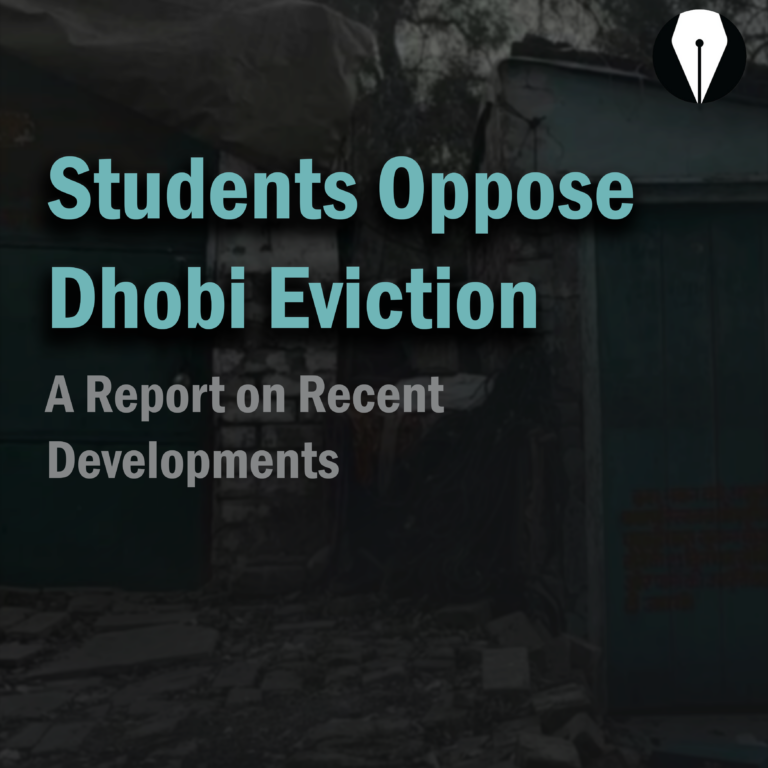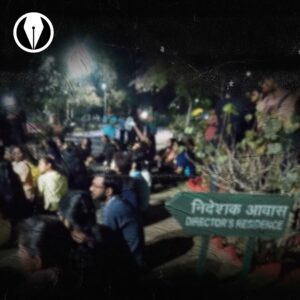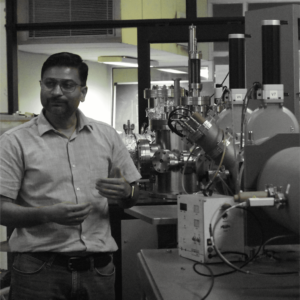Three beds in a room for two and two cupboards for three seem to be the ‘new normal’ for the campus residents. From lack of walking space in rooms, lack of chairs in mess to ceilings “almost” falling on one’s head, it is despairing to see how much of an anomaly has been normalised. Our team took a dive into the issue, talking to various stakeholders like Hall Executive Committees, workers, Gymkhana Executives, and the Associate Dean of Hostel Affairs. Read on to learn about the root problems and the current state of proposed solutions.
Current Allocation & Crunch
As on August 2022, the campus had 9289 residents. However, the current infrastructure provides space for only 7141. This is primarily because of the increase in batch size of incoming UG and PG batches.
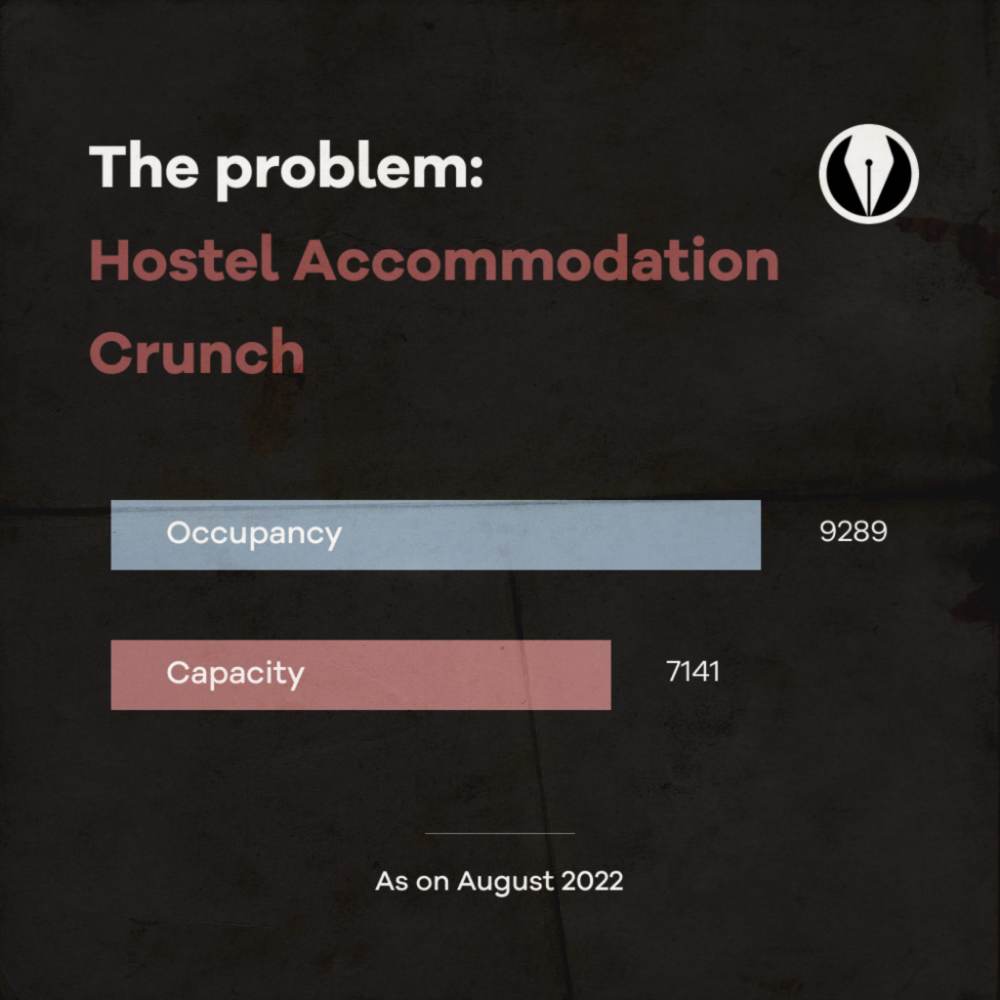
Hall Allocation Policy (HAP) is a policy the student body representatives suggest to the Hall Allocation and Advisory Committee, the institute body responsible for handling hostel affairs. Last year, the Hall Allocation Policy was proposed in two parts: one with the scenario without the construction of Hall 14 and the second with Hall 14 in usage. It was initially expected that Hall 14 would be handed over for use by January’23. Following many delays, in the latest open house, the administration assured that it would finally be ready for occupation in June’23.
Further changes in allocation occurred from what was proposed in HAP 2022-23 because of the following reasons:
A projected number was sent for PhDs and MSRs, but the actual number was less as many students dropped out for better prospects.
The actual number of Masters’ students was more than what was anticipated.
The projected number of degree extensions was almost twice what was anticipated. (130 instead of 63)
Currently, the occupancy status and capacity of different halls is shown by the given figurea.
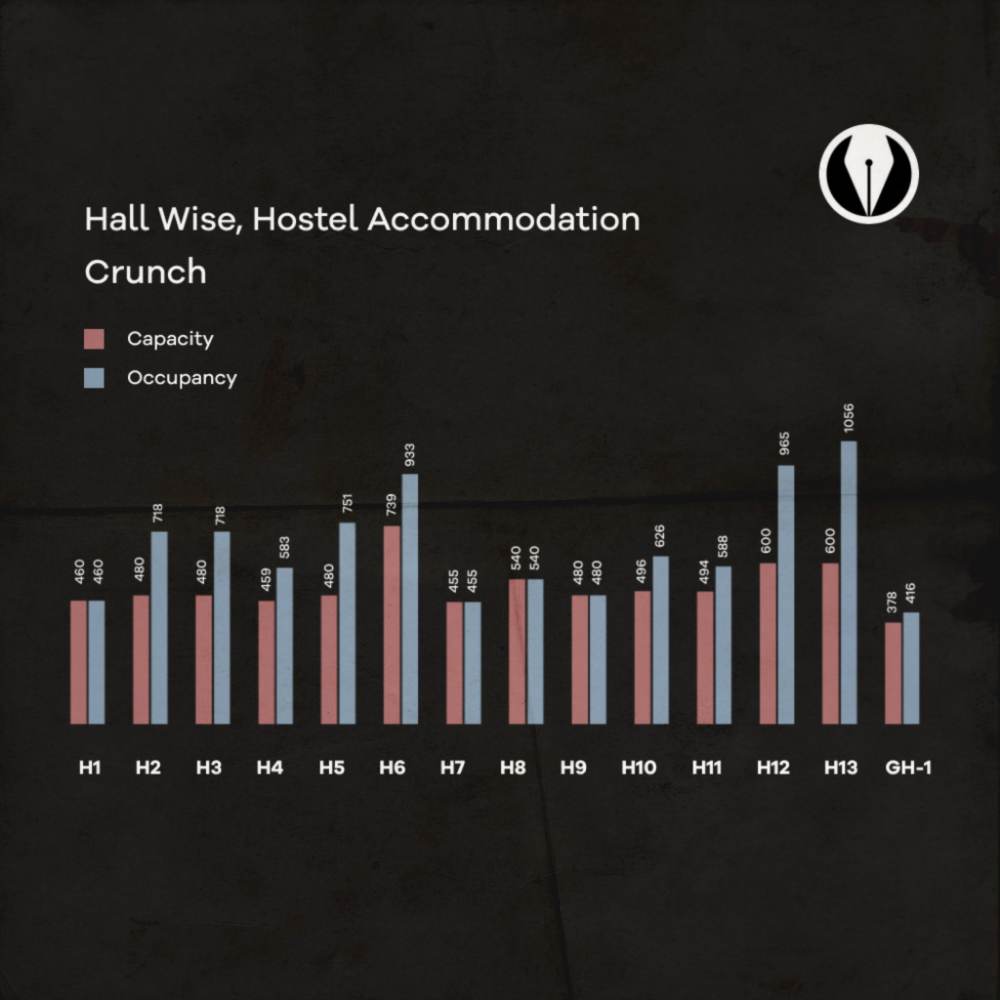
Problems Posed by Crunch
Three primary sources cater to a hall’s fund requirements: HEC, Hall Development Fund(HDF), and Dean’s Capital Fund(DCF). The DoSA office allots the DCF, which has reduced significantly in the last year.
The argument given for reduction in DCF is that as the number of students in a hall has increased, the funds collected from the hostel fee have also increased. However, it is noteworthy that an increased student count also increases the need for resources for maintaining the hall. But due to the reduction of DCF, the total available funds for maintenance have reduced. Thus many halls still struggle with fund requirements for various amenities like washing machines, maintenance of common rooms, etc.
The crunch manifests in more problems like a lack of room space to study. As many rooms currently accommodate more students than their capacity, there are fewer tables, cupboards, and available space in rooms than required for each member. Thus it is tough for many students to study in their rooms simultaneously. Other resources like mess facilities are also overloaded. Many feel that resources like washing machines need frequent repairs due to overuse.
Due to the crunch, the current allocation of hostel rooms in many halls requires both PG and UG students to coexist, which has resulted in various complaints and issues. PG students have reported noise disturbances caused by UG students, while frequent room shifting has added to the inconvenience.
Moreover, this year’s scheduled intake of winter PG students posed a challenge due to the severe crunch in the hostel space. Student representatives had suggested to the administration that either no admissions should be made this year or the first semester should be conducted online. Consequently, the institute had to limit the intake to only 100 students.
The Plight of Old Hostels
Halls 1-4, built nearly 60 years ago, require timely repair and renovation. However, the most recent internal maintenance (painting and room restoration) was completed in 2009, and the most recent external maintenance was completed in 2011.
Direct exposure to sunlight, rain, and water seepage through ceilings has weakened roofs and ceilings in old hostels. The dilapidated condition of these hostels came to light when falling plaster blocks became a common scene in Hall 3 a year ago. During last year’s monsoon, incidents of falling plaster damaging property and injuring students were reported. In one such complaint, a 2-by-2 chunk of plaster fell on a student’s bed- he got hit on the head, and his roommate’s phone was also damaged. To cover the incident, the institute offered compensation for the roommate’s phone. Similar incidents have been reported in Hall 2 as well. While the institute has taken some action, the repair and renovation process has been hindered by the rules and procedures in place.
When action was required, the Department of Civil Engineering gathered a group of professors and requested a list of the affected rooms. It was decided that the plaster would be reapplied to the roofs of Halls 2 and 3. Although nothing happened for a while, subsequent monsoons saw similar incidents. Finally, after the end-semester exams in November, Hall 3 Hall Executive Committee(HEC) received an email asking them to vacate 51 rooms to allow the work to start. To understand how inefficient the whole process is, consider this case:
Hall 3 HEC filled out form 101 (preliminary inspection) for interior and exterior maintenance back in (April 2022). Consequently, Institute Works Department’s (IWD) officials came to verify the complaint and concluded that the hall needed touch-ups in the common area. The HEC was asked to fill another 101(August 2022). The HEC had to fill three more 101s for external maintenance, interior maintenance, and repairing cracks. Currently, these forms are approved by the IWD and lie somewhere in the DoIP office. As for the 51 rooms, they have been promised to be handed over by the monsoon of 2023.
According to President Hall 3, a reason why approvals take as long as they do is that the institute starts documentation in January to prepare for the annual audit (which takes place towards the end of March). Meanwhile, approvals are stretched over 6-7 months to save work and money.
“The DoIP asks us to talk to the Dean, but even if the Dean approves, the DoIP sends officials for verification, pushing us back to square one. Tenures end without anything concrete happening.”
-Hall 3, President
Administration's Views
To get the administration’s point of view on the issue, we contacted the Associate Dean, Hall Affairs (ADHA), in December 2022. On the question of the crunch, he informed us that it is impossible to relieve the crunch immediately. However, work is underway towards shifting third-year UGs to crunch-free accommodations by the next academic year.
Regarding funding, he informed us that infrastructure funding is under the purview of DoIP while DCF is under the control of DoSA. The job of ADHA is to inform DoIP and DoSA about space requirements. To learn more about the funding and plans, we contacted the DoIP multiple times but didn’t get a response.
Finally, when asked about the mishaps in Hall 3, the ADHA told us that renovation was underway in 51 rooms in Hall 3 and 28 rooms in Hall 2. DoIP has asked them to complete the renovation in two months and is working towards it. However, there are no plans right now for overall full-scale renovations. He added that there are plans to get Hall 13 and GH repainted because they represent the institute to parents.
Future Plans
In the recent open house held on construction issues (here), the institute officials laid down their proposed future solutions to alleviate the residential crunch at the campus. In the open house, the administration emphasised that the institute faces challenges in gathering funds for hostel construction.
This is primarily since the Ministry of Education stopped giving grants for hostel construction(or any construction or equipment). Therefore, the institute has to raise the money from its earnings over the maintenance cost it incurs. The institute depends on alum funding and Higher Education Financing Agency(HEFA) loans for hostel building. However, for loans, the application and paperwork take a long time. The ADPI further mentioned the long-term and short-term plans for releasing the crunch.
Long-Term Plans: Upcoming hostels
Hall 14
Capacity: 765 boys
Expected Completion Date: June 2023
Projected cost: ~45cr
Hall 15
Capacity: 1000 rooms (2000 seats)
Expected Completion Date: June 2025
Projected cost: ~100cr
Current Status: Tender for construction is about to be floated.
Hall 16:
Capacity: 1000 rooms (2000 seats)
Expected Completion Date: March 2026
Projected cost: ~100cr
Current Status: The loan sought for the construction of Hall 16 is pending approval from the Ministry of Education.
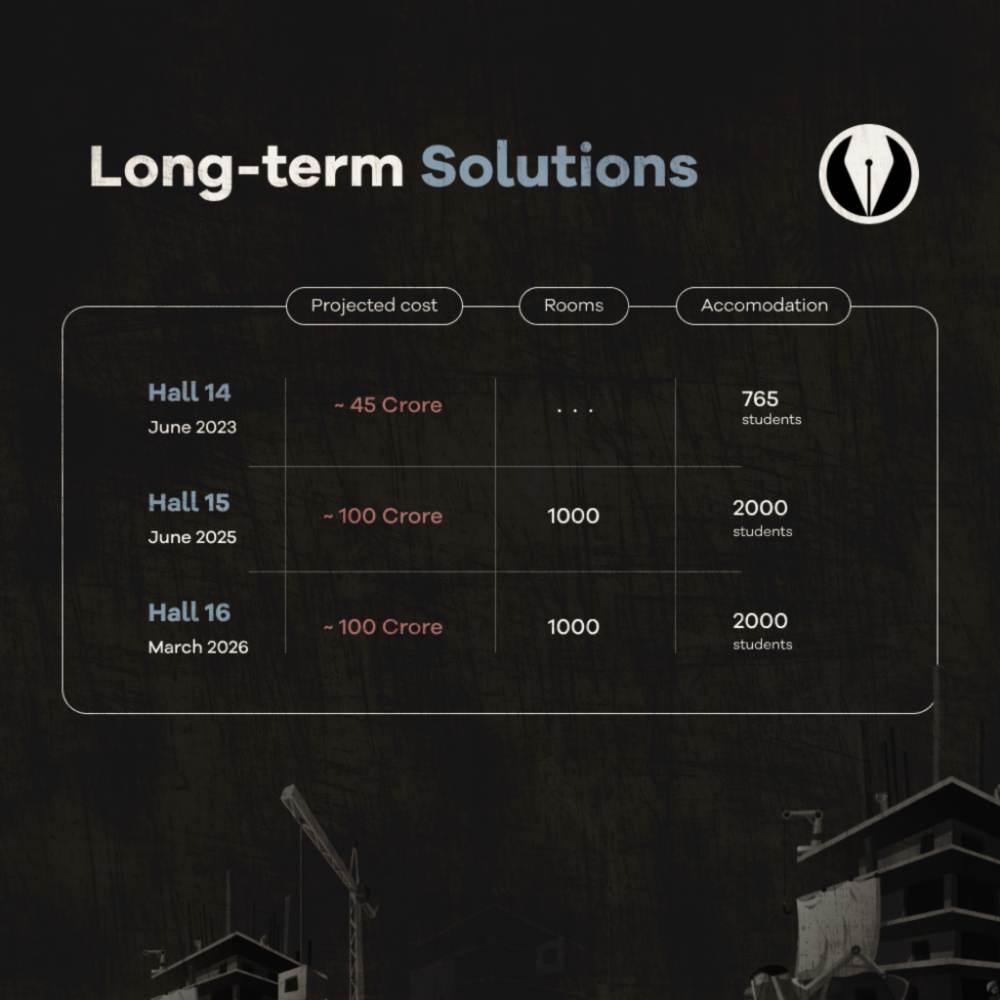
2. Short-term Relief
Four blocks of around 220 rooms each are planned in existing hostels. One in the girls’ hostels and three in the boys’ hostels
Each block costs ~10cr
The first block (divided equally in GH-1 and Hall 4) prioritised for girl students as they can’t be mobilised to other halls
Blocks in boys’ hostels to be built by December 2023
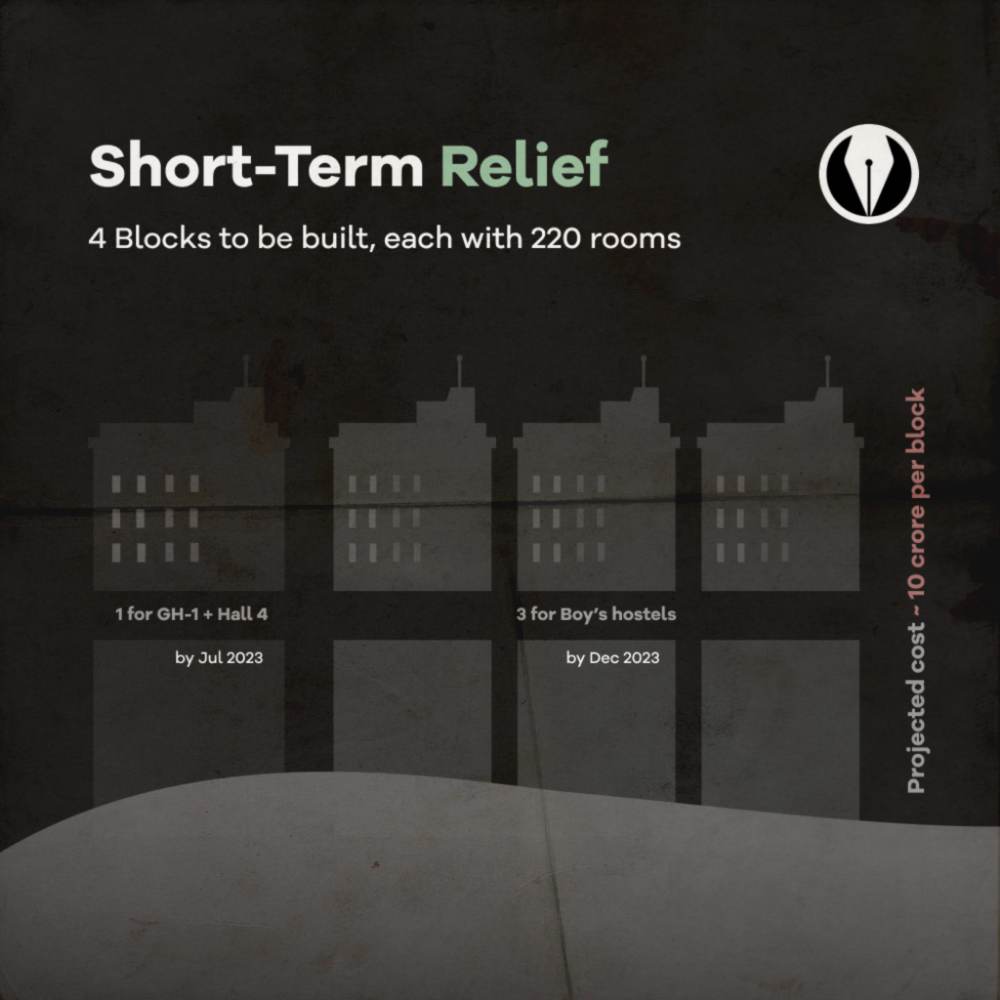
3. Open Spaces in Halls
Due to the lack of space, it was emphasised that open spaces and recreational facilities must be centralised for everyone with the increased student population. Hall 12 was taken as an example to emphasise the point: it accommodates more students despite having the lowest plot area. ADPI said Halls 14, 15, and 16 would have no sports facilities. However, it was ensured that the present facilities would be protected.
On the girls’ residential crunch issue, it was further said that new hostels in 3-4 years would ultimately alleviate the situation in the long term.
Conclusion
The infrastructure bottleneck has manifested itself in almost all facets of our campus life, from finding a chair in the mess and a walking space in your over-boarded room to falling ceilings and frequent room changes. It is perhaps one of the most critical concerns facing the campus—a problem that everyone not only knows about but is also a part of.
Although the institute has proposed the construction of new hostels, their timely availability for accommodation is doubtful as construction dates have been delayed multiple times over the past few years. It is high time that promised solutions are delivered timely and other aspects of crunch like lack of space in academic area (library and spaces to study), overload on resources and workers are looked at.
a -Source: Open-house conducted on 4th April
Written by: Aarish Khan, Aditya Mishra, Gauravi Chandak, Mohika Agarwal, Mutasim Khan, Rahul Jha, Utkarsh Agrawal, Zainab Fatima
Edited by: Bhavya Sikarwar
Design Credits: Deekshansh Vardhan, Praneat Data, Sachidanand Navik
Photo Credits: Manan Kabra






